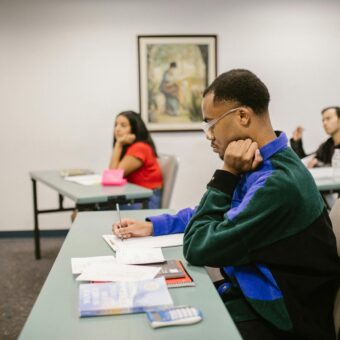At his modest yet charismatic office at FSB Leicester, adorned with Confucius quotes, Dr Joe Ce Qiao – an English for Academic Purposes (EAP) Tutor, reflects on his work with an air of intellectual curiosity. His passion lies in understanding “Willingness to Communicate (WTC)” — a research concept he has studied deeply since 2017. As he sits back, deep in thought, Dr Qiao explains that “classroom silence, reluctance and language anxiety” are key elements that are shaping WTC. He believes that the dynamics of communication within classrooms go beyond linguistic barriers and plunge (head first) into the psychological and social dimensions that influence students’ behaviour.
Dr Qiao’s extensive research focuses on the often-overlooked particulars of student engagement. Silence, often viewed negatively in educational contexts, takes on a more profound meaning when seen through the research lens of WTC (see MacIntyre et al., 1998). He asks: “Whenever FSB students are silent, is it because they lack linguistic ability or is there something deeper?” His research has prompted academics to ask critical questions about how they manage classroom interactions. “Do I give enough comprehensible input before I encourage students to communicate? Have I addressed their anxiety or apprehensions?”
Dr Qiao believes that understanding and improving WTC can dramatically reshape educational outcomes across Higher Education. “When students understand their unwillingness to communicate, they are better equipped to engage actively. This is not just a linguistic issue! it is about cultivating confidence and a sense of belonging in the classroom.” His personal experience highlights this belief. “During my degree, reading recommended journals and papers, even when I felt lazy, prepared me to engage. My WTC directly correlated with how well I knew the material.”
His innovative term, ABU (Able But Unwilling to respond), further advances FSB’s understanding of classroom dynamics. Unlike traditional models of WTC, ABU shifts the focus to the social and psychological factors behind student silence. Dr Qiao says, “For me, ABU allows us to see the students who are linguistically capable but remain silent due to fear of being judged or seen as a show-off.” This rethinking of silence reveals the complex interplay between ability and behaviours – especially in multicultural and multilingual classrooms.
Dr Zahra Fatima, Associate Dean at FSB Leicester, says: “Dr Qiao’s work is reframing how we see student participation at FSB. By understanding the nuanced barriers to communication, we can create more inclusive and supportive learning environments.”
Building on this, Mr Mohammed Zaidi, CEO of FSB, reflects on the broader significance of Dr Qiao’s research: “This work not only enhances our academic framework but touches the very heart of what education should be— empowering every student to find their voice.” Mr Zaidi continues, “Dr Qiao’s concept of ABU is pivotal in helping our educators understand that silence in the classroom is more complex than we thought. It is about more than language — it’s about identity, confidence and the broader social factors that shape how students interact.”
Dr Qiao’s work, therefore, extends beyond linguistic theory into the psychosocial realm and addresses how culture, identity and fear all shape educational experiences at FSB. “Some students are often caught between modesty and fear — fear of being seen as too ambitious or not capable enough,” Dr Qiao explains.
For educators, this research offers transformative insights. Dr Qiao encourages teachers to go beyond assessing students’ linguistic skills, instead focusing on the deeper social behaviours that silence can represent. “We must create classrooms where students feel safe to speak – rather than just be capable to speak,” he asserts.
‘This philosophy aligns with FSB’s broader commitment to inclusivity and academic excellence, where student wellbeing is seen as central to intellectual growth,’ added Mr Mohammed Zaidi, FSB’s CEO. “Dr Qiao’s work offers a very important exploration of the delicate balance between ability and willingness in classroom communication. His introduction of ABU presents a significant view of student reticence and opens doors to more compassionate, informed teaching practices. By challenging the conventional understanding of silence and encouraging critical thinking, Dr Qiao is not only reshaping academic research but transforming how we perceive and engage with students in higher education.”
At FSB, Dr Qiao’s research reminds us that education is not just about knowledge transfer — it’s about building an environment where every student’s voice, silent or otherwise, is valued.
For inquiries regarding this article, please feel free to contact the author, Kunal Chan Mehta, at kunal.mehta@fairfield.ac.
We trust you found FSB News engaging and informative. Step into our academic realm and unlock boundless avenues for personal and professional development at www.fsb.ac.uk/courses or through admissions@fairfield.ac. Embrace the possibilities at FSB and commence your transformative educational journey today.
Read more of Dr Qiao’s work here:
Qiao C (2022) Methodological Issues in Approaching Confucianism and its Influence on Confucian Heritage Culture/CHC Learners’ Reticence. Journal of Education and Social Policy, 9 (3). https://www.jespnet.com/; https://doi.org/10.30845/jesp.v9n3p1
Reference
MacIntyre, P. D., Z. Dörnyei, R. Clément, and K.A. Noels.
-
- Conceptualizing willingness to communicate in a L2: A situational model of L2 confidence and affiliation. The Modern Language Journal 82(4):545–62.

